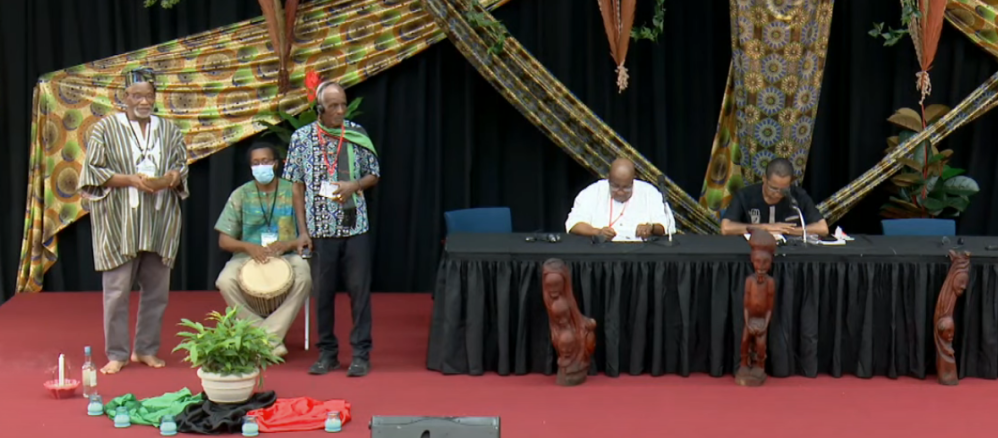Yoselina Guevara López
 The Global Afrikan Congress (GAC) began this Thursday, August 4, in Barbados, an International Conference on Reparations, under the theme Sankofa “repair the damage, repair the imbalance, justice must be done”. The event is being held at the Roy Marshall Teaching Complex of the University of the West Indies (UWI) in Cave Hill and will feature a full program. This initiative is supported by the Barbados Task Force on Reparations, the UWI Cave Hill and the Barbados Tourism Marketing Inc.
The Global Afrikan Congress (GAC) began this Thursday, August 4, in Barbados, an International Conference on Reparations, under the theme Sankofa “repair the damage, repair the imbalance, justice must be done”. The event is being held at the Roy Marshall Teaching Complex of the University of the West Indies (UWI) in Cave Hill and will feature a full program. This initiative is supported by the Barbados Task Force on Reparations, the UWI Cave Hill and the Barbados Tourism Marketing Inc.
This International Conference on Reparations takes place 20 years after the creation of the GAC in Barbados, and 21 years after the Durban Declaration and Programme of Action, in which 168 member states of the United Nations declared that the transatlantic slave trade and the enslavement of Africans was a crime against humanity.
The topics for discussion at these conferences will be the following:
1. Reparations initiatives around the world
2. Legal and practical options to pursue reparatory justice
3. What next? – The multidimensional approach for easy reparations wins
4. Who does what? The post-conference work plan for pursuit of reparatory justice.
Sankofa ancestral symbol

This is not a random use of the word Sankofa as part of the name of this lecture series, it is a profound and powerful symbol of African culture. The Sankofa is represented by a bird that turns around and takes with its mouth an egg behind it. The symbol has its origins in the Akan culture of the Ashanti. In the Twi language, its meaning is “san” (to turn), “ko” (to go) and “fa” (to look, seek and take). Which basically can be translated as “go back, know your past and then build your future”.
Perhaps this is why the Sankofa has become the symbol of many Afro descendants, but also of those who those uprooted from their land, those who have forgotten or have never known their roots and their people.
This makes it a universal symbol that is intrinsically associated with ancestral wisdom: knowing how to observe before acting, to think before speaking, to learn before starting something new; depth, observation, knowledge and then action.
To energize the attainment of restorative justice
In this sense, this International Conference on Reparations starts from the deep meaning of Sankofa, from the combination of theory but aimed at achieving the objectives through practical action. According to the organizers of the event, it will first examine reparations achievements around the world, discuss options and legal approaches to restorative justice approaches, and identify ways in which reparations can be paid.
But while this statistical and theoretical background is relevant, even more important is the quest to encourage all Pan-Africanist organizations to recognize the importance of restorative justice, as well as to encourage Black people around the world to redouble their efforts to mobilize in the struggle for reparations.
Moreover, the Global Afrikan Congress hopes to reach out to a large number of young people, motivating them to be co-participants and protagonists in the quest for the implementation of restorative justice.
What are reparations for slavery?
Reparations are a legal social justice mechanism consisting of restitution payments for slavery remitted to the descendants of enslaved persons, Afro-descendants.
Reparations programs recognize and address the harms caused by human rights violations such as slavery, segregation or the systematic denial of fair housing, education and employment opportunities.
Reparations involve payments and support from states that promoted and sustained African slavery to eligible beneficiaries to help overcome the lasting intergenerational consequences of human rights violations. Reparations programs require the participation of victims’ representatives in their design and implementation.
Reparations do not only include making a financial payment; reparations programs proposed for descendants of enslaved Afro-descendants are multi-component interventions that may include formal apologies, public acknowledgment of historical injustice and its current manifestations, community-level initiatives to invest in education, housing and infrastructure, and access to counseling and therapy for trauma that is passed from generation to generation.
Hence the importance of the campaign being developed by the Global Afrikan Congress to ensure that the beneficiaries of the transatlantic slave trade receive full compensation, which does not exclude any of the points outlined above. The development of a 10-year Reparations Action Plan to be developed by the Global Afrikan Congress with entities like the Caricom Reparations Commission (CRC) will be one of the most important outcomes of the International Conference on Reparations.
Yoselina Guevara L.(@lopez_yoselina)is an international policy political analyst, correspondent and recipient of the Simón Bolívar 2022 National Journalism Award (Opinion) and Anibal Nazoa 2021 (Venezuela).